Economics Report: Energy Efficiency, CO2 Emissions, and Governance
VerifiedAdded on 2021/10/06
|9
|2308
|71
Report
AI Summary
This economics report provides a comprehensive literature review on the relationship between CO2 emissions, energy efficiency, and governance with economic growth. The report explores the impact of energy consumption and industrialization on environmental factors, highlighting the importance of energy efficiency in mitigating increasing carbon dioxide emissions. It examines the influence of governance and institutional quality on economic conditions, discussing how policy implications and efficient governance can foster economic growth. The literature review covers topics such as energy efficiency and economic growth, governance and economic growth, and the interplay between energy efficiency and governance. The findings emphasize the close linkage between energy efficiency, carbon dioxide emissions, and governance with economic growth, while also acknowledging limitations related to the absence of empirical research methodology. The report concludes by emphasizing the need for further research using proper statistical data and empirical methodologies to analyze the impact of these factors on economic growth more effectively.
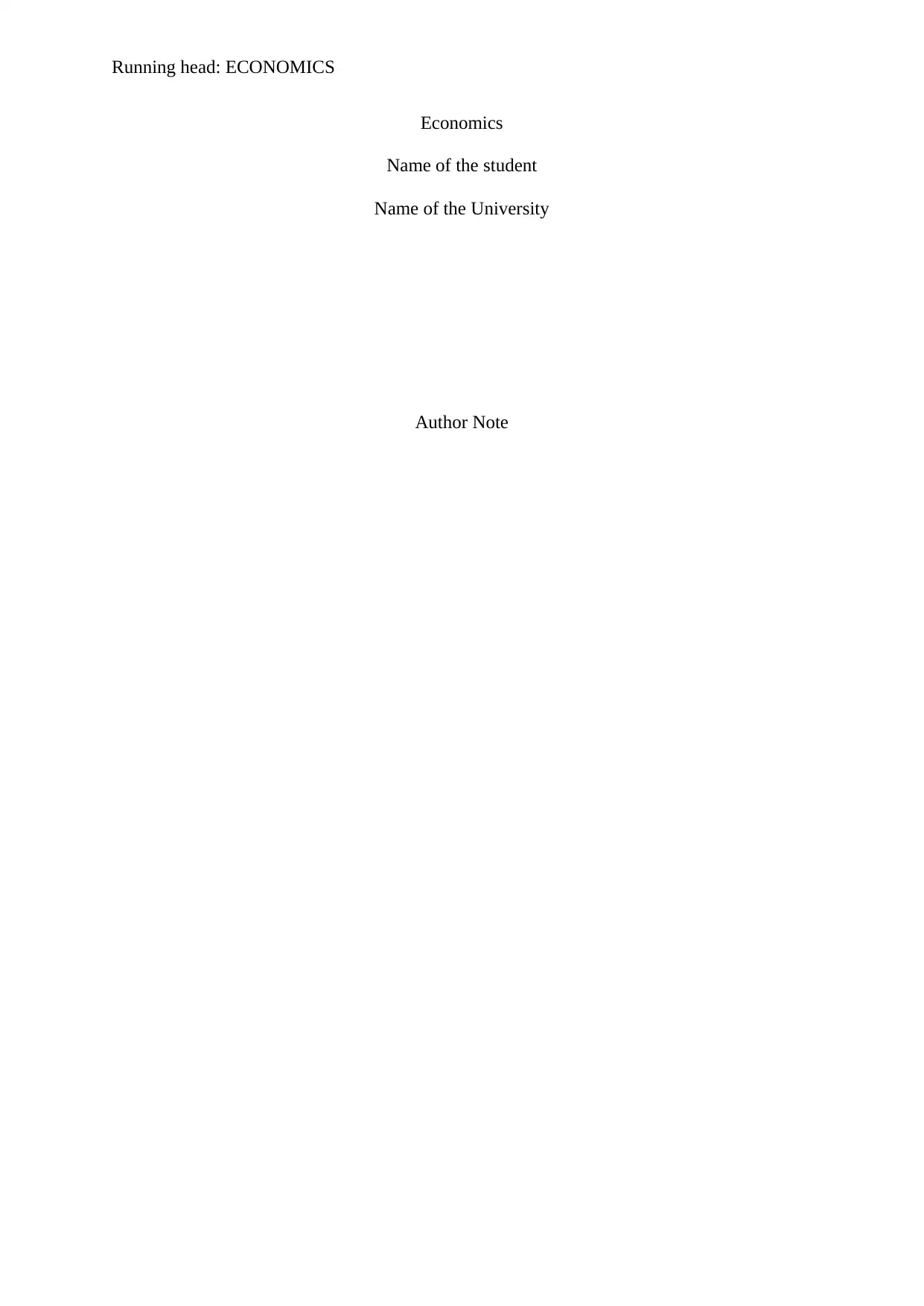
Running head: ECONOMICS
Economics
Name of the student
Name of the University
Author Note
Economics
Name of the student
Name of the University
Author Note
Paraphrase This Document
Need a fresh take? Get an instant paraphrase of this document with our AI Paraphraser

1ECONOMICS
Table of Contents
Introduction:...............................................................................................................................2
Literature Review:......................................................................................................................2
Findings and limitations:............................................................................................................6
References:.................................................................................................................................7
Table of Contents
Introduction:...............................................................................................................................2
Literature Review:......................................................................................................................2
Findings and limitations:............................................................................................................6
References:.................................................................................................................................7
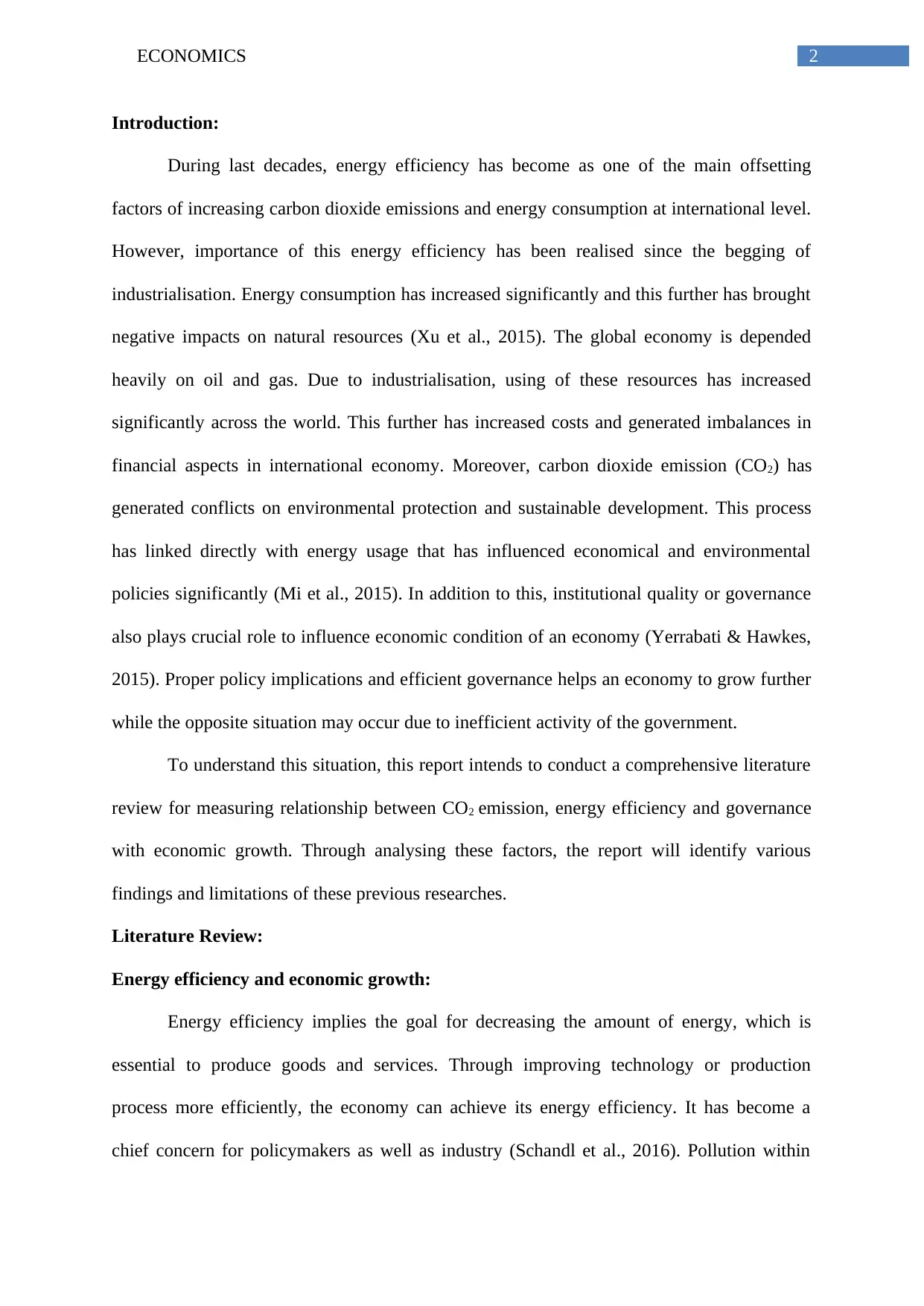
2ECONOMICS
Introduction:
During last decades, energy efficiency has become as one of the main offsetting
factors of increasing carbon dioxide emissions and energy consumption at international level.
However, importance of this energy efficiency has been realised since the begging of
industrialisation. Energy consumption has increased significantly and this further has brought
negative impacts on natural resources (Xu et al., 2015). The global economy is depended
heavily on oil and gas. Due to industrialisation, using of these resources has increased
significantly across the world. This further has increased costs and generated imbalances in
financial aspects in international economy. Moreover, carbon dioxide emission (CO2) has
generated conflicts on environmental protection and sustainable development. This process
has linked directly with energy usage that has influenced economical and environmental
policies significantly (Mi et al., 2015). In addition to this, institutional quality or governance
also plays crucial role to influence economic condition of an economy (Yerrabati & Hawkes,
2015). Proper policy implications and efficient governance helps an economy to grow further
while the opposite situation may occur due to inefficient activity of the government.
To understand this situation, this report intends to conduct a comprehensive literature
review for measuring relationship between CO2 emission, energy efficiency and governance
with economic growth. Through analysing these factors, the report will identify various
findings and limitations of these previous researches.
Literature Review:
Energy efficiency and economic growth:
Energy efficiency implies the goal for decreasing the amount of energy, which is
essential to produce goods and services. Through improving technology or production
process more efficiently, the economy can achieve its energy efficiency. It has become a
chief concern for policymakers as well as industry (Schandl et al., 2016). Pollution within
Introduction:
During last decades, energy efficiency has become as one of the main offsetting
factors of increasing carbon dioxide emissions and energy consumption at international level.
However, importance of this energy efficiency has been realised since the begging of
industrialisation. Energy consumption has increased significantly and this further has brought
negative impacts on natural resources (Xu et al., 2015). The global economy is depended
heavily on oil and gas. Due to industrialisation, using of these resources has increased
significantly across the world. This further has increased costs and generated imbalances in
financial aspects in international economy. Moreover, carbon dioxide emission (CO2) has
generated conflicts on environmental protection and sustainable development. This process
has linked directly with energy usage that has influenced economical and environmental
policies significantly (Mi et al., 2015). In addition to this, institutional quality or governance
also plays crucial role to influence economic condition of an economy (Yerrabati & Hawkes,
2015). Proper policy implications and efficient governance helps an economy to grow further
while the opposite situation may occur due to inefficient activity of the government.
To understand this situation, this report intends to conduct a comprehensive literature
review for measuring relationship between CO2 emission, energy efficiency and governance
with economic growth. Through analysing these factors, the report will identify various
findings and limitations of these previous researches.
Literature Review:
Energy efficiency and economic growth:
Energy efficiency implies the goal for decreasing the amount of energy, which is
essential to produce goods and services. Through improving technology or production
process more efficiently, the economy can achieve its energy efficiency. It has become a
chief concern for policymakers as well as industry (Schandl et al., 2016). Pollution within
⊘ This is a preview!⊘
Do you want full access?
Subscribe today to unlock all pages.

Trusted by 1+ million students worldwide
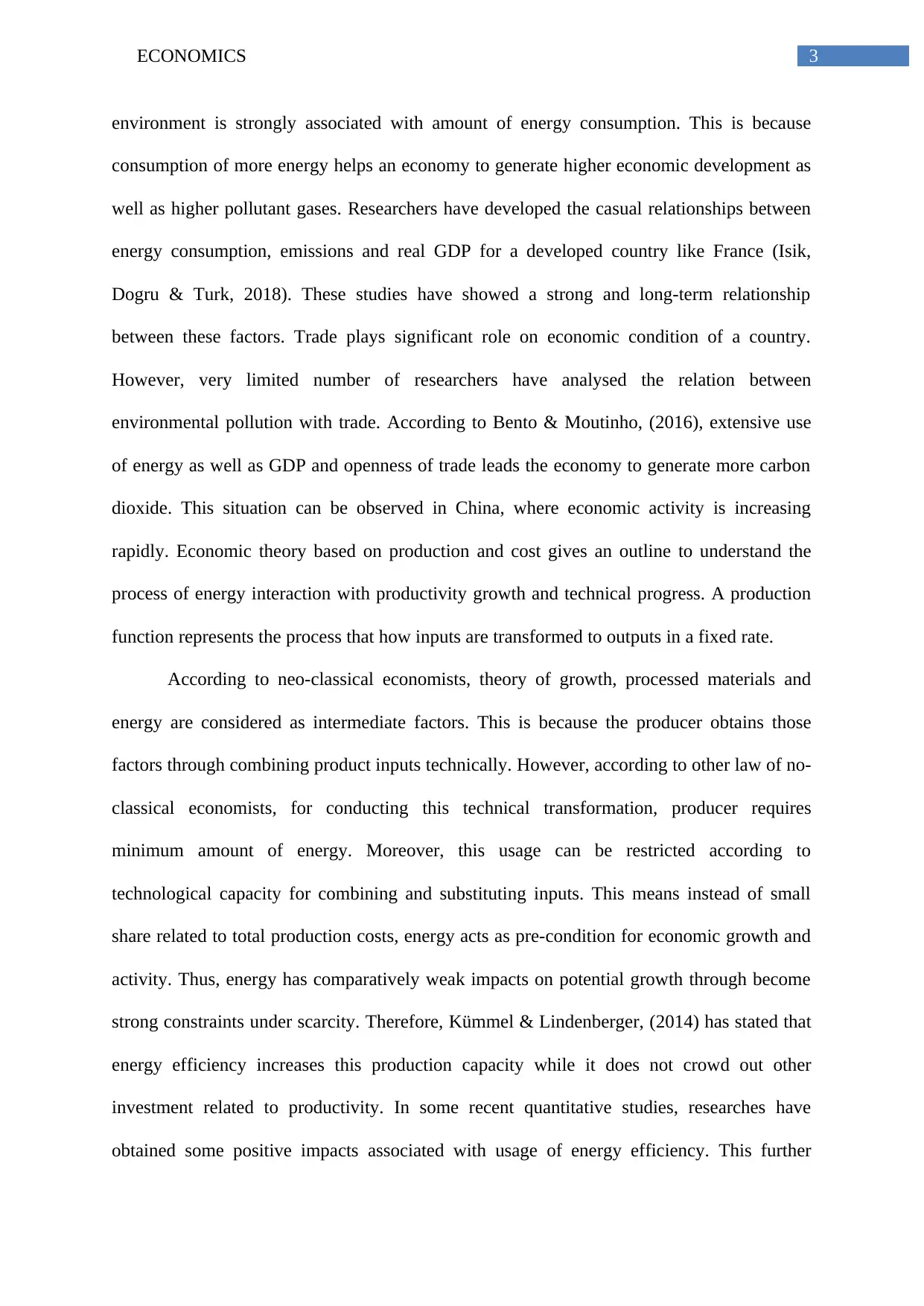
3ECONOMICS
environment is strongly associated with amount of energy consumption. This is because
consumption of more energy helps an economy to generate higher economic development as
well as higher pollutant gases. Researchers have developed the casual relationships between
energy consumption, emissions and real GDP for a developed country like France (Isik,
Dogru & Turk, 2018). These studies have showed a strong and long-term relationship
between these factors. Trade plays significant role on economic condition of a country.
However, very limited number of researchers have analysed the relation between
environmental pollution with trade. According to Bento & Moutinho, (2016), extensive use
of energy as well as GDP and openness of trade leads the economy to generate more carbon
dioxide. This situation can be observed in China, where economic activity is increasing
rapidly. Economic theory based on production and cost gives an outline to understand the
process of energy interaction with productivity growth and technical progress. A production
function represents the process that how inputs are transformed to outputs in a fixed rate.
According to neo-classical economists, theory of growth, processed materials and
energy are considered as intermediate factors. This is because the producer obtains those
factors through combining product inputs technically. However, according to other law of no-
classical economists, for conducting this technical transformation, producer requires
minimum amount of energy. Moreover, this usage can be restricted according to
technological capacity for combining and substituting inputs. This means instead of small
share related to total production costs, energy acts as pre-condition for economic growth and
activity. Thus, energy has comparatively weak impacts on potential growth through become
strong constraints under scarcity. Therefore, Kümmel & Lindenberger, (2014) has stated that
energy efficiency increases this production capacity while it does not crowd out other
investment related to productivity. In some recent quantitative studies, researches have
obtained some positive impacts associated with usage of energy efficiency. This further
environment is strongly associated with amount of energy consumption. This is because
consumption of more energy helps an economy to generate higher economic development as
well as higher pollutant gases. Researchers have developed the casual relationships between
energy consumption, emissions and real GDP for a developed country like France (Isik,
Dogru & Turk, 2018). These studies have showed a strong and long-term relationship
between these factors. Trade plays significant role on economic condition of a country.
However, very limited number of researchers have analysed the relation between
environmental pollution with trade. According to Bento & Moutinho, (2016), extensive use
of energy as well as GDP and openness of trade leads the economy to generate more carbon
dioxide. This situation can be observed in China, where economic activity is increasing
rapidly. Economic theory based on production and cost gives an outline to understand the
process of energy interaction with productivity growth and technical progress. A production
function represents the process that how inputs are transformed to outputs in a fixed rate.
According to neo-classical economists, theory of growth, processed materials and
energy are considered as intermediate factors. This is because the producer obtains those
factors through combining product inputs technically. However, according to other law of no-
classical economists, for conducting this technical transformation, producer requires
minimum amount of energy. Moreover, this usage can be restricted according to
technological capacity for combining and substituting inputs. This means instead of small
share related to total production costs, energy acts as pre-condition for economic growth and
activity. Thus, energy has comparatively weak impacts on potential growth through become
strong constraints under scarcity. Therefore, Kümmel & Lindenberger, (2014) has stated that
energy efficiency increases this production capacity while it does not crowd out other
investment related to productivity. In some recent quantitative studies, researches have
obtained some positive impacts associated with usage of energy efficiency. This further
Paraphrase This Document
Need a fresh take? Get an instant paraphrase of this document with our AI Paraphraser
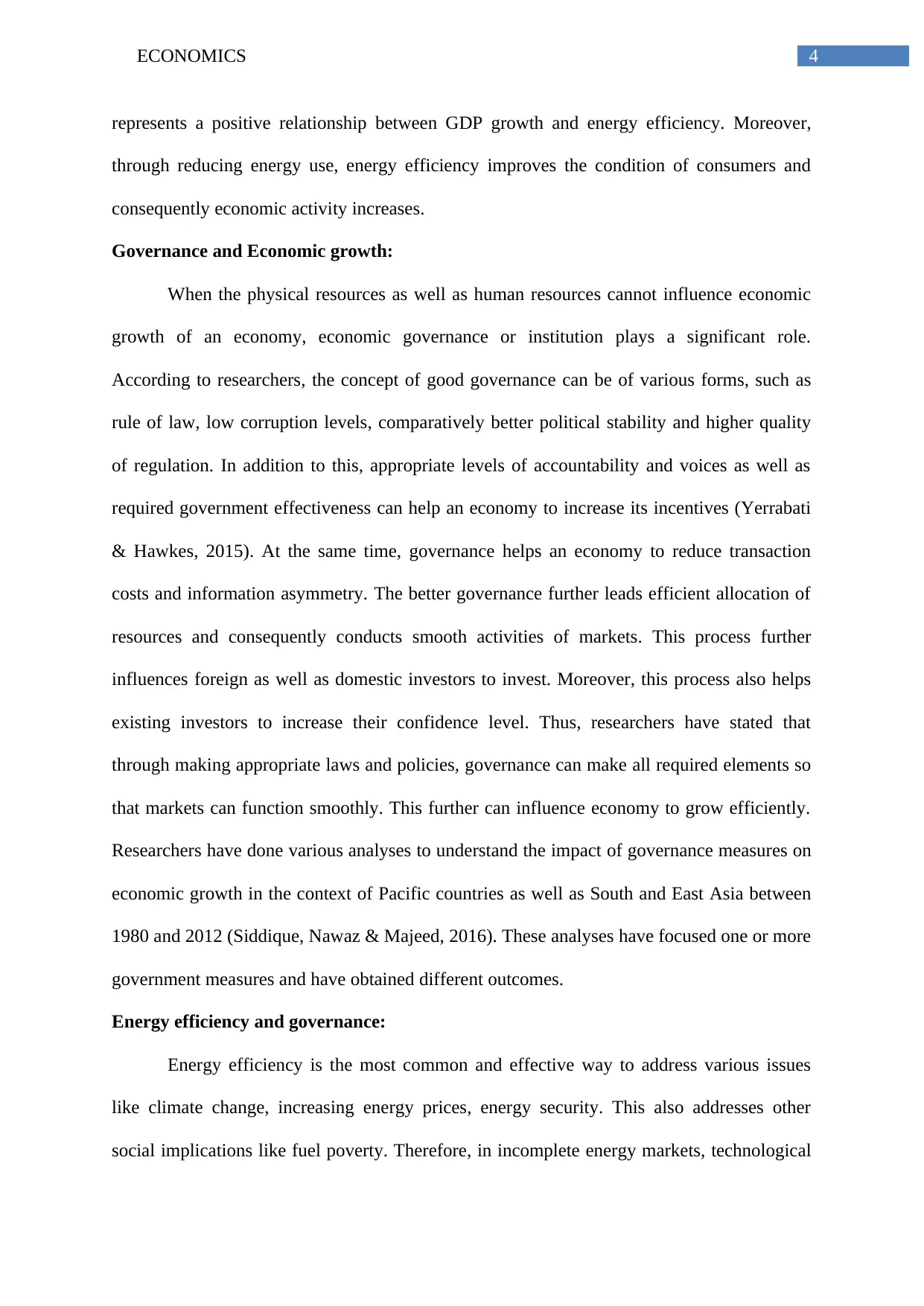
4ECONOMICS
represents a positive relationship between GDP growth and energy efficiency. Moreover,
through reducing energy use, energy efficiency improves the condition of consumers and
consequently economic activity increases.
Governance and Economic growth:
When the physical resources as well as human resources cannot influence economic
growth of an economy, economic governance or institution plays a significant role.
According to researchers, the concept of good governance can be of various forms, such as
rule of law, low corruption levels, comparatively better political stability and higher quality
of regulation. In addition to this, appropriate levels of accountability and voices as well as
required government effectiveness can help an economy to increase its incentives (Yerrabati
& Hawkes, 2015). At the same time, governance helps an economy to reduce transaction
costs and information asymmetry. The better governance further leads efficient allocation of
resources and consequently conducts smooth activities of markets. This process further
influences foreign as well as domestic investors to invest. Moreover, this process also helps
existing investors to increase their confidence level. Thus, researchers have stated that
through making appropriate laws and policies, governance can make all required elements so
that markets can function smoothly. This further can influence economy to grow efficiently.
Researchers have done various analyses to understand the impact of governance measures on
economic growth in the context of Pacific countries as well as South and East Asia between
1980 and 2012 (Siddique, Nawaz & Majeed, 2016). These analyses have focused one or more
government measures and have obtained different outcomes.
Energy efficiency and governance:
Energy efficiency is the most common and effective way to address various issues
like climate change, increasing energy prices, energy security. This also addresses other
social implications like fuel poverty. Therefore, in incomplete energy markets, technological
represents a positive relationship between GDP growth and energy efficiency. Moreover,
through reducing energy use, energy efficiency improves the condition of consumers and
consequently economic activity increases.
Governance and Economic growth:
When the physical resources as well as human resources cannot influence economic
growth of an economy, economic governance or institution plays a significant role.
According to researchers, the concept of good governance can be of various forms, such as
rule of law, low corruption levels, comparatively better political stability and higher quality
of regulation. In addition to this, appropriate levels of accountability and voices as well as
required government effectiveness can help an economy to increase its incentives (Yerrabati
& Hawkes, 2015). At the same time, governance helps an economy to reduce transaction
costs and information asymmetry. The better governance further leads efficient allocation of
resources and consequently conducts smooth activities of markets. This process further
influences foreign as well as domestic investors to invest. Moreover, this process also helps
existing investors to increase their confidence level. Thus, researchers have stated that
through making appropriate laws and policies, governance can make all required elements so
that markets can function smoothly. This further can influence economy to grow efficiently.
Researchers have done various analyses to understand the impact of governance measures on
economic growth in the context of Pacific countries as well as South and East Asia between
1980 and 2012 (Siddique, Nawaz & Majeed, 2016). These analyses have focused one or more
government measures and have obtained different outcomes.
Energy efficiency and governance:
Energy efficiency is the most common and effective way to address various issues
like climate change, increasing energy prices, energy security. This also addresses other
social implications like fuel poverty. Therefore, in incomplete energy markets, technological
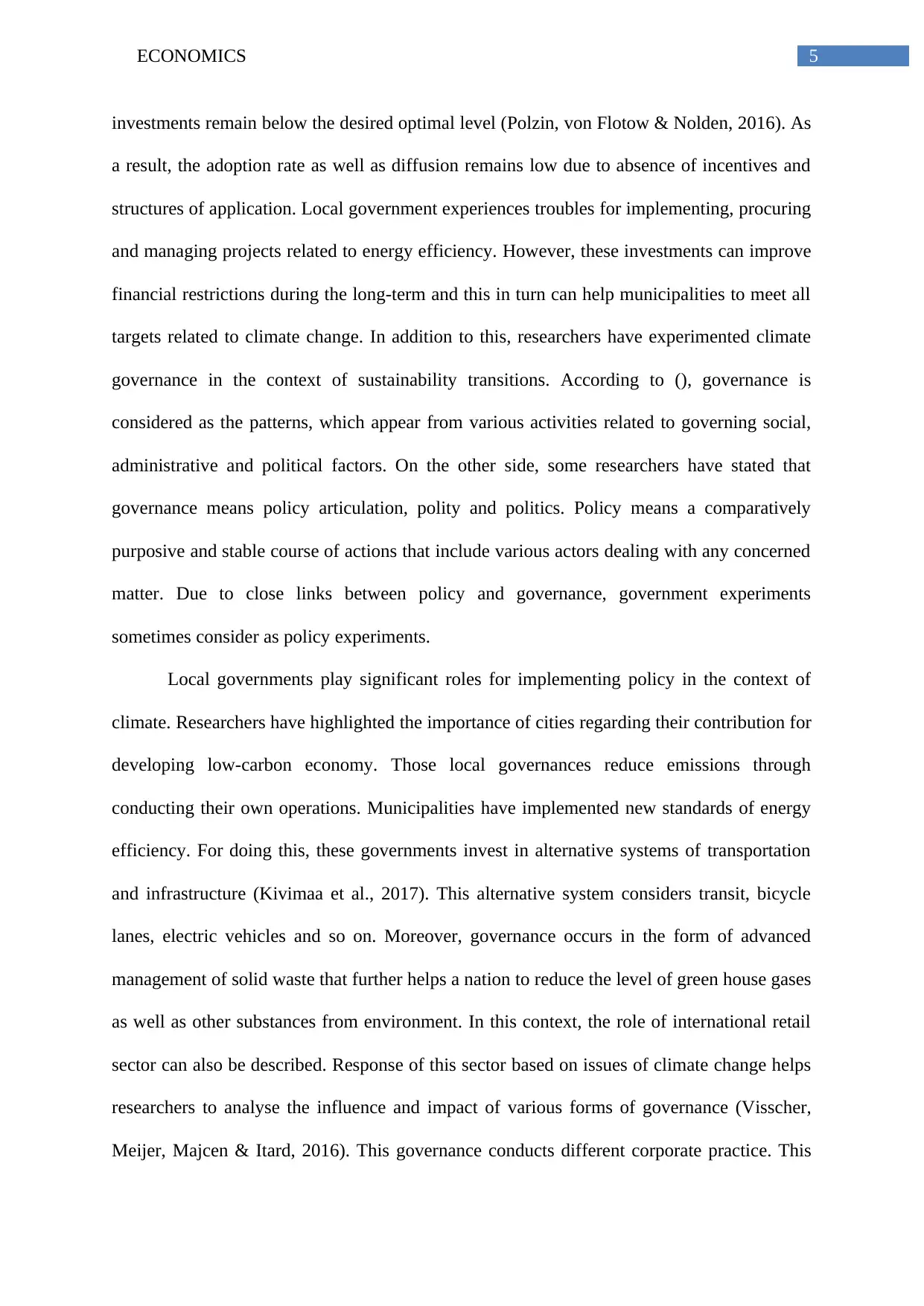
5ECONOMICS
investments remain below the desired optimal level (Polzin, von Flotow & Nolden, 2016). As
a result, the adoption rate as well as diffusion remains low due to absence of incentives and
structures of application. Local government experiences troubles for implementing, procuring
and managing projects related to energy efficiency. However, these investments can improve
financial restrictions during the long-term and this in turn can help municipalities to meet all
targets related to climate change. In addition to this, researchers have experimented climate
governance in the context of sustainability transitions. According to (), governance is
considered as the patterns, which appear from various activities related to governing social,
administrative and political factors. On the other side, some researchers have stated that
governance means policy articulation, polity and politics. Policy means a comparatively
purposive and stable course of actions that include various actors dealing with any concerned
matter. Due to close links between policy and governance, government experiments
sometimes consider as policy experiments.
Local governments play significant roles for implementing policy in the context of
climate. Researchers have highlighted the importance of cities regarding their contribution for
developing low-carbon economy. Those local governances reduce emissions through
conducting their own operations. Municipalities have implemented new standards of energy
efficiency. For doing this, these governments invest in alternative systems of transportation
and infrastructure (Kivimaa et al., 2017). This alternative system considers transit, bicycle
lanes, electric vehicles and so on. Moreover, governance occurs in the form of advanced
management of solid waste that further helps a nation to reduce the level of green house gases
as well as other substances from environment. In this context, the role of international retail
sector can also be described. Response of this sector based on issues of climate change helps
researchers to analyse the influence and impact of various forms of governance (Visscher,
Meijer, Majcen & Itard, 2016). This governance conducts different corporate practice. This
investments remain below the desired optimal level (Polzin, von Flotow & Nolden, 2016). As
a result, the adoption rate as well as diffusion remains low due to absence of incentives and
structures of application. Local government experiences troubles for implementing, procuring
and managing projects related to energy efficiency. However, these investments can improve
financial restrictions during the long-term and this in turn can help municipalities to meet all
targets related to climate change. In addition to this, researchers have experimented climate
governance in the context of sustainability transitions. According to (), governance is
considered as the patterns, which appear from various activities related to governing social,
administrative and political factors. On the other side, some researchers have stated that
governance means policy articulation, polity and politics. Policy means a comparatively
purposive and stable course of actions that include various actors dealing with any concerned
matter. Due to close links between policy and governance, government experiments
sometimes consider as policy experiments.
Local governments play significant roles for implementing policy in the context of
climate. Researchers have highlighted the importance of cities regarding their contribution for
developing low-carbon economy. Those local governances reduce emissions through
conducting their own operations. Municipalities have implemented new standards of energy
efficiency. For doing this, these governments invest in alternative systems of transportation
and infrastructure (Kivimaa et al., 2017). This alternative system considers transit, bicycle
lanes, electric vehicles and so on. Moreover, governance occurs in the form of advanced
management of solid waste that further helps a nation to reduce the level of green house gases
as well as other substances from environment. In this context, the role of international retail
sector can also be described. Response of this sector based on issues of climate change helps
researchers to analyse the influence and impact of various forms of governance (Visscher,
Meijer, Majcen & Itard, 2016). This governance conducts different corporate practice. This
⊘ This is a preview!⊘
Do you want full access?
Subscribe today to unlock all pages.

Trusted by 1+ million students worldwide
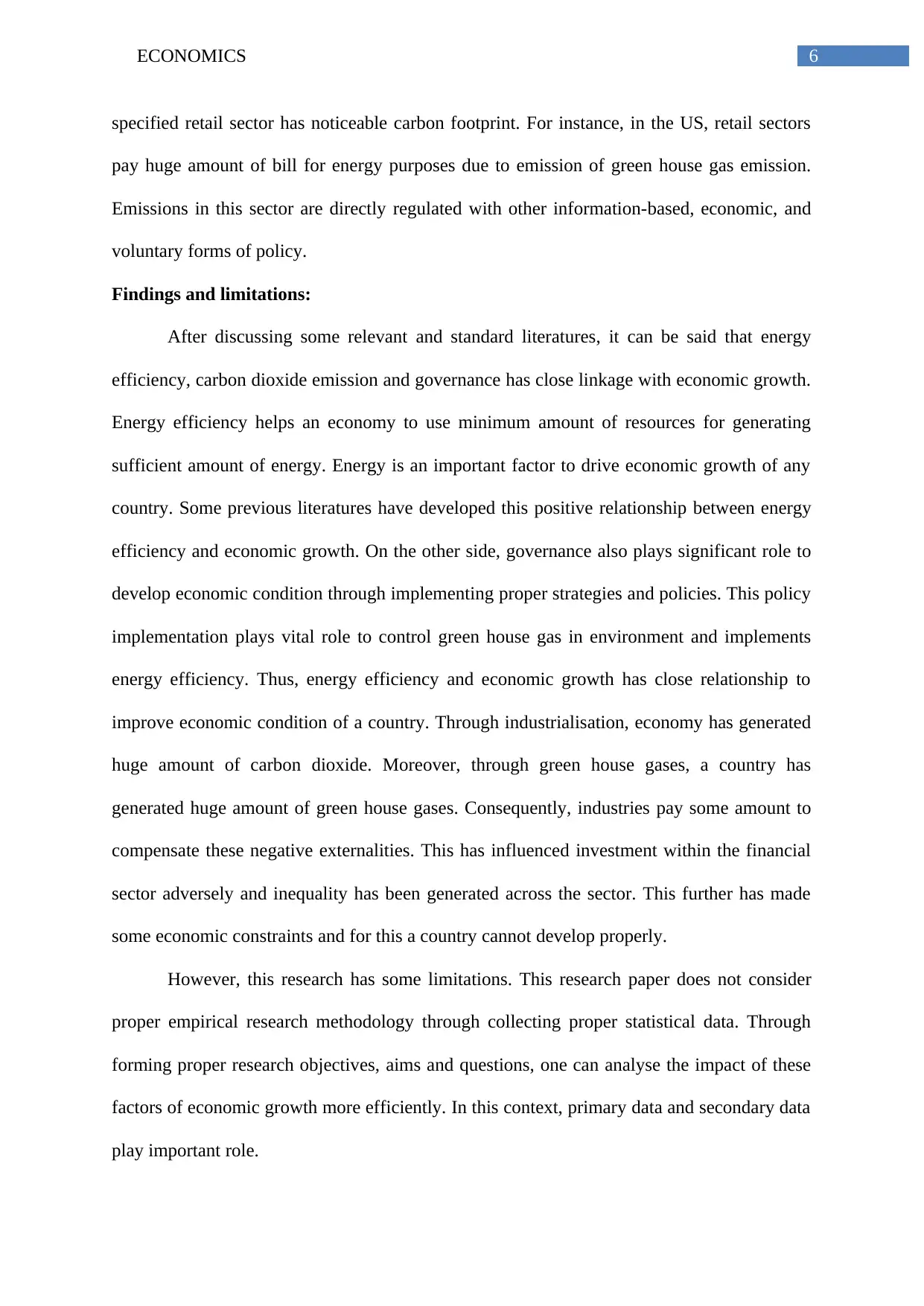
6ECONOMICS
specified retail sector has noticeable carbon footprint. For instance, in the US, retail sectors
pay huge amount of bill for energy purposes due to emission of green house gas emission.
Emissions in this sector are directly regulated with other information-based, economic, and
voluntary forms of policy.
Findings and limitations:
After discussing some relevant and standard literatures, it can be said that energy
efficiency, carbon dioxide emission and governance has close linkage with economic growth.
Energy efficiency helps an economy to use minimum amount of resources for generating
sufficient amount of energy. Energy is an important factor to drive economic growth of any
country. Some previous literatures have developed this positive relationship between energy
efficiency and economic growth. On the other side, governance also plays significant role to
develop economic condition through implementing proper strategies and policies. This policy
implementation plays vital role to control green house gas in environment and implements
energy efficiency. Thus, energy efficiency and economic growth has close relationship to
improve economic condition of a country. Through industrialisation, economy has generated
huge amount of carbon dioxide. Moreover, through green house gases, a country has
generated huge amount of green house gases. Consequently, industries pay some amount to
compensate these negative externalities. This has influenced investment within the financial
sector adversely and inequality has been generated across the sector. This further has made
some economic constraints and for this a country cannot develop properly.
However, this research has some limitations. This research paper does not consider
proper empirical research methodology through collecting proper statistical data. Through
forming proper research objectives, aims and questions, one can analyse the impact of these
factors of economic growth more efficiently. In this context, primary data and secondary data
play important role.
specified retail sector has noticeable carbon footprint. For instance, in the US, retail sectors
pay huge amount of bill for energy purposes due to emission of green house gas emission.
Emissions in this sector are directly regulated with other information-based, economic, and
voluntary forms of policy.
Findings and limitations:
After discussing some relevant and standard literatures, it can be said that energy
efficiency, carbon dioxide emission and governance has close linkage with economic growth.
Energy efficiency helps an economy to use minimum amount of resources for generating
sufficient amount of energy. Energy is an important factor to drive economic growth of any
country. Some previous literatures have developed this positive relationship between energy
efficiency and economic growth. On the other side, governance also plays significant role to
develop economic condition through implementing proper strategies and policies. This policy
implementation plays vital role to control green house gas in environment and implements
energy efficiency. Thus, energy efficiency and economic growth has close relationship to
improve economic condition of a country. Through industrialisation, economy has generated
huge amount of carbon dioxide. Moreover, through green house gases, a country has
generated huge amount of green house gases. Consequently, industries pay some amount to
compensate these negative externalities. This has influenced investment within the financial
sector adversely and inequality has been generated across the sector. This further has made
some economic constraints and for this a country cannot develop properly.
However, this research has some limitations. This research paper does not consider
proper empirical research methodology through collecting proper statistical data. Through
forming proper research objectives, aims and questions, one can analyse the impact of these
factors of economic growth more efficiently. In this context, primary data and secondary data
play important role.
Paraphrase This Document
Need a fresh take? Get an instant paraphrase of this document with our AI Paraphraser
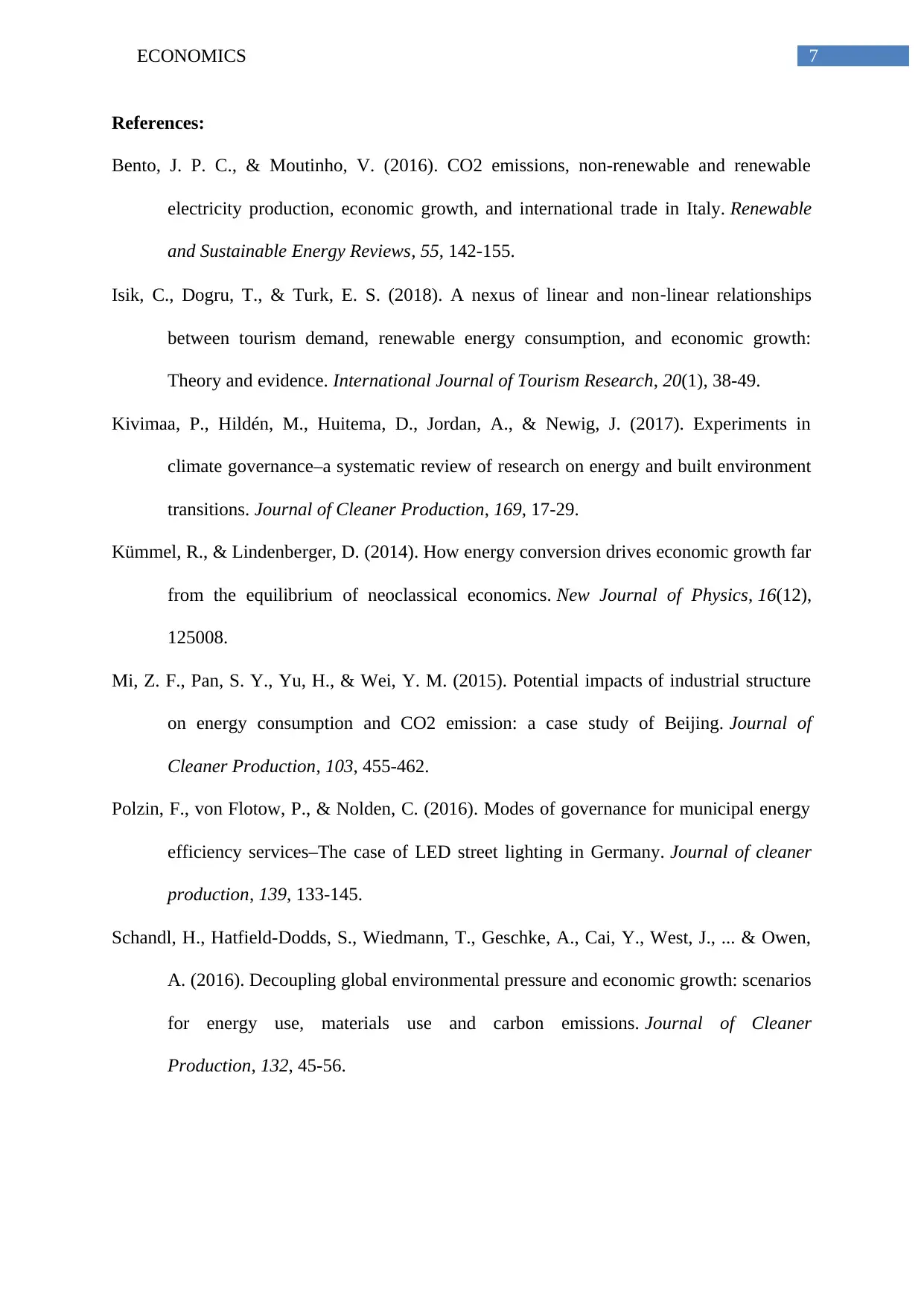
7ECONOMICS
References:
Bento, J. P. C., & Moutinho, V. (2016). CO2 emissions, non-renewable and renewable
electricity production, economic growth, and international trade in Italy. Renewable
and Sustainable Energy Reviews, 55, 142-155.
Isik, C., Dogru, T., & Turk, E. S. (2018). A nexus of linear and non‐linear relationships
between tourism demand, renewable energy consumption, and economic growth:
Theory and evidence. International Journal of Tourism Research, 20(1), 38-49.
Kivimaa, P., Hildén, M., Huitema, D., Jordan, A., & Newig, J. (2017). Experiments in
climate governance–a systematic review of research on energy and built environment
transitions. Journal of Cleaner Production, 169, 17-29.
Kümmel, R., & Lindenberger, D. (2014). How energy conversion drives economic growth far
from the equilibrium of neoclassical economics. New Journal of Physics, 16(12),
125008.
Mi, Z. F., Pan, S. Y., Yu, H., & Wei, Y. M. (2015). Potential impacts of industrial structure
on energy consumption and CO2 emission: a case study of Beijing. Journal of
Cleaner Production, 103, 455-462.
Polzin, F., von Flotow, P., & Nolden, C. (2016). Modes of governance for municipal energy
efficiency services–The case of LED street lighting in Germany. Journal of cleaner
production, 139, 133-145.
Schandl, H., Hatfield-Dodds, S., Wiedmann, T., Geschke, A., Cai, Y., West, J., ... & Owen,
A. (2016). Decoupling global environmental pressure and economic growth: scenarios
for energy use, materials use and carbon emissions. Journal of Cleaner
Production, 132, 45-56.
References:
Bento, J. P. C., & Moutinho, V. (2016). CO2 emissions, non-renewable and renewable
electricity production, economic growth, and international trade in Italy. Renewable
and Sustainable Energy Reviews, 55, 142-155.
Isik, C., Dogru, T., & Turk, E. S. (2018). A nexus of linear and non‐linear relationships
between tourism demand, renewable energy consumption, and economic growth:
Theory and evidence. International Journal of Tourism Research, 20(1), 38-49.
Kivimaa, P., Hildén, M., Huitema, D., Jordan, A., & Newig, J. (2017). Experiments in
climate governance–a systematic review of research on energy and built environment
transitions. Journal of Cleaner Production, 169, 17-29.
Kümmel, R., & Lindenberger, D. (2014). How energy conversion drives economic growth far
from the equilibrium of neoclassical economics. New Journal of Physics, 16(12),
125008.
Mi, Z. F., Pan, S. Y., Yu, H., & Wei, Y. M. (2015). Potential impacts of industrial structure
on energy consumption and CO2 emission: a case study of Beijing. Journal of
Cleaner Production, 103, 455-462.
Polzin, F., von Flotow, P., & Nolden, C. (2016). Modes of governance for municipal energy
efficiency services–The case of LED street lighting in Germany. Journal of cleaner
production, 139, 133-145.
Schandl, H., Hatfield-Dodds, S., Wiedmann, T., Geschke, A., Cai, Y., West, J., ... & Owen,
A. (2016). Decoupling global environmental pressure and economic growth: scenarios
for energy use, materials use and carbon emissions. Journal of Cleaner
Production, 132, 45-56.
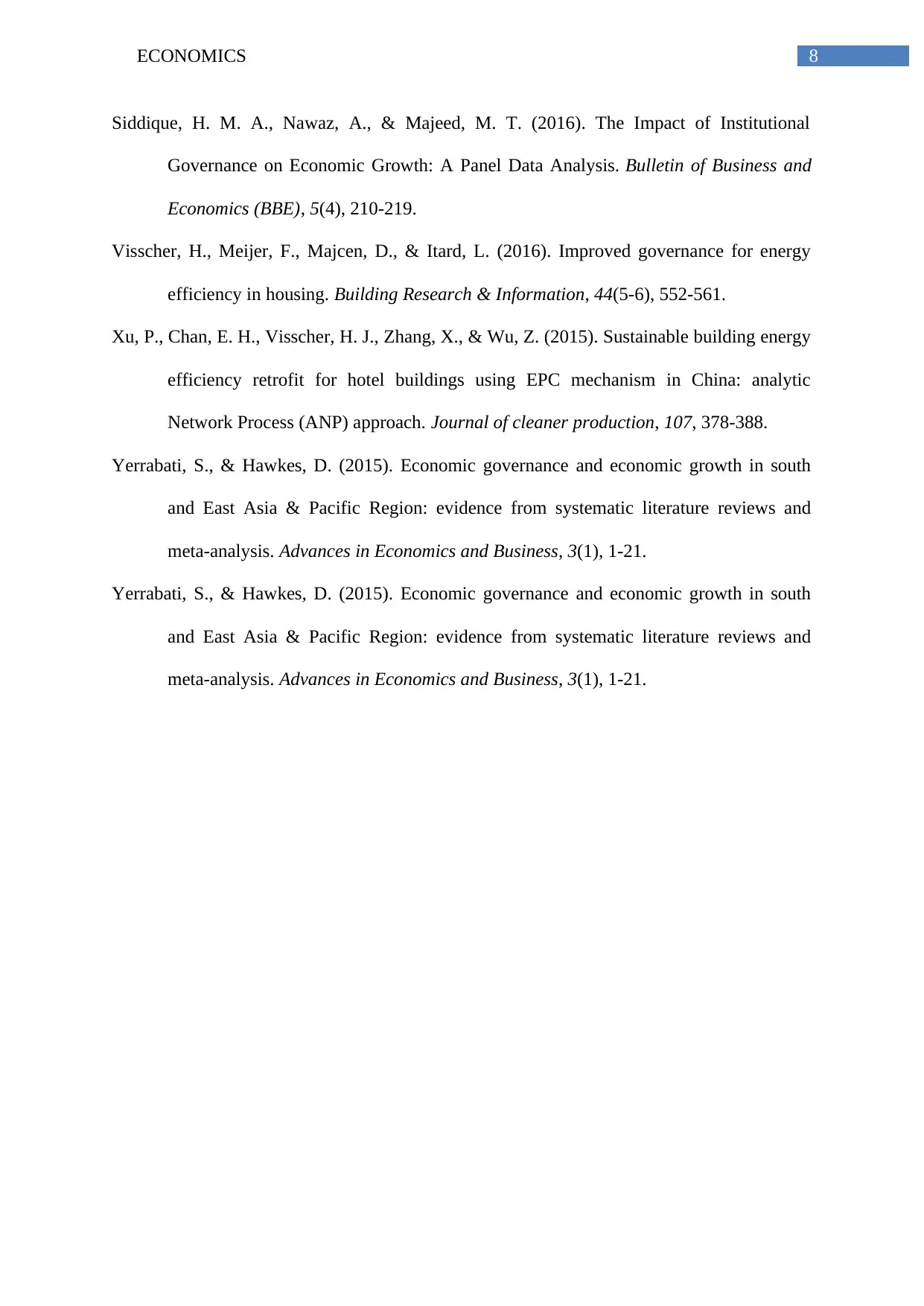
8ECONOMICS
Siddique, H. M. A., Nawaz, A., & Majeed, M. T. (2016). The Impact of Institutional
Governance on Economic Growth: A Panel Data Analysis. Bulletin of Business and
Economics (BBE), 5(4), 210-219.
Visscher, H., Meijer, F., Majcen, D., & Itard, L. (2016). Improved governance for energy
efficiency in housing. Building Research & Information, 44(5-6), 552-561.
Xu, P., Chan, E. H., Visscher, H. J., Zhang, X., & Wu, Z. (2015). Sustainable building energy
efficiency retrofit for hotel buildings using EPC mechanism in China: analytic
Network Process (ANP) approach. Journal of cleaner production, 107, 378-388.
Yerrabati, S., & Hawkes, D. (2015). Economic governance and economic growth in south
and East Asia & Pacific Region: evidence from systematic literature reviews and
meta-analysis. Advances in Economics and Business, 3(1), 1-21.
Yerrabati, S., & Hawkes, D. (2015). Economic governance and economic growth in south
and East Asia & Pacific Region: evidence from systematic literature reviews and
meta-analysis. Advances in Economics and Business, 3(1), 1-21.
Siddique, H. M. A., Nawaz, A., & Majeed, M. T. (2016). The Impact of Institutional
Governance on Economic Growth: A Panel Data Analysis. Bulletin of Business and
Economics (BBE), 5(4), 210-219.
Visscher, H., Meijer, F., Majcen, D., & Itard, L. (2016). Improved governance for energy
efficiency in housing. Building Research & Information, 44(5-6), 552-561.
Xu, P., Chan, E. H., Visscher, H. J., Zhang, X., & Wu, Z. (2015). Sustainable building energy
efficiency retrofit for hotel buildings using EPC mechanism in China: analytic
Network Process (ANP) approach. Journal of cleaner production, 107, 378-388.
Yerrabati, S., & Hawkes, D. (2015). Economic governance and economic growth in south
and East Asia & Pacific Region: evidence from systematic literature reviews and
meta-analysis. Advances in Economics and Business, 3(1), 1-21.
Yerrabati, S., & Hawkes, D. (2015). Economic governance and economic growth in south
and East Asia & Pacific Region: evidence from systematic literature reviews and
meta-analysis. Advances in Economics and Business, 3(1), 1-21.
⊘ This is a preview!⊘
Do you want full access?
Subscribe today to unlock all pages.

Trusted by 1+ million students worldwide
1 out of 9
Related Documents
Your All-in-One AI-Powered Toolkit for Academic Success.
+13062052269
info@desklib.com
Available 24*7 on WhatsApp / Email
![[object Object]](/_next/static/media/star-bottom.7253800d.svg)
Unlock your academic potential
Copyright © 2020–2026 A2Z Services. All Rights Reserved. Developed and managed by ZUCOL.



